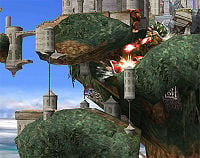Cave of life

A cave of life is a term for an enclosed area in a stage where characters can survive to much higher percentages than usual. These areas have an impassable platform above the area, and can contain other walls, which allows characters to tech and survive potentially fatal blows. Even without teching, characters will bounce off the ceiling, which absorbs some of the knockback, and allows the character to survive longer than usual.
Caves of life are often considered a degenerative aspect of a stage for competitive play. Besides allowing characters to survive attacks well beyond what is usually possible, they often provide overly powerful camping positions (due to their enclosed nature and the difficulty of KOing characters within them), and they produce an over centralisation on teching (players skilled at teching receive a disproportional advantage from them in comparisons to players who can't tech so well). As such, most stages with them are universally banned from tournaments, and stages with more minor caves of life are rarely legal.
Examples
These are the stages in the Super Smash Bros. series that contain caves of life.
Brinstar Depths
The stage provides rather minor caves of life that are caused by two floating, moderately sized platforms that are impassable and thus can be tech/bounced off of. However, both are temporary due to the frequent rotating of the stage, and don't have as large of an effect that other caves of life do.
Luigi's Mansion
The stage contains impassable platforms that create caves of life. These platforms can be temporarily destroyed by destroying the railings supporting the platforms, making the caves of life temporary. Despite having these caves of life, this stage has been sometimes allowed in tournaments as a counterpick, though is rarely legal nowadays.
Mario Bros.
The numerous, impassable platforms of the stage create prominent caves of life throughout; the official blog even says that the stage "throws all the normal rules out the window".
Mushroom Kingdom
The bricks in the stage create multiple caves of life throughout the stage. However, since the bricks are breakable by attacks and hitting into to them from below, none of the caves of life are permanent.
Mushroomy Kingdom
Both versions of the stage have caves of life due to numerous bricks (similar to the bricks in Mushroom Kingdom), though this is much more prominent in 1-2. However, since the bricks are again breakable and the stage is a scrolling stage, the caves of life are temporary in 1-1; due to the brick ceiling of 1-2, however, caves of life are almost always available.
Pokemon Stadium
In both Melee and Brawl variations, the fire transformation has a very small cave of life on the left side of the tree. No more than one character can fit underneath though, and characters are easily hit out of it, greatly hindering its effectiveness. In Brawl, the windmill in the water stage produces an unusual cave of life. Depending on how the blades are rotated, it creates a very effective cave of life that even without teching will send the opponent straight down to the stage, or will send the opponent downwards off the stage if they don't tech. Pokemon Stadium is notable for being the only stage in Melee and Brawl with potential caves of life that is universally legal (and is even a starter stage often in the latter, while being a starter for a long time of the former's existence).
Rumble Falls
Some areas of the stage have impassable ceilings and walls, which create a cave of life effect. The scrolling nature of the stage however, make them all temporary.
Spear Pillar
The underground tunnel area produces a large and permanent cave of life, though a third of the ceiling of the area can be temporarily destroyed by the Pokémon of the stage, temporarily reducing the size of this cave of life.
Summit
The bottom area produces a cave of life that lasts for most of the stage's cycle, except for when the standable area in the bottom area falls below the water's surface; icicles that fall from the ceiling of this cave can also knock opponents out of it.
Temple
The lower area of the stage is a large cave of life and is the most well known; Nintendo Power referred to it as a "fight club". Besides having a ceiling, the area has a wall on the upper left, a sloped ceiling to the lower right, and a slope on the upper right, which provides both a floor and ceiling to tech or bounce off of. The large amount of walls and the overly large size of Temple allows characters to survive in this area much longer than they're usually capable of even without teching. With teching, characters can survive longer here than they feasibly can in any other non custom stage.
Yoshi's Island
This stage has two small caves of life created by the trio of rotating blocks, which are impassable when not spinning. Since the blocks spin when hit, neither cave is permanent, and the stage is often banned for other, more significant reasons.
Custom Stage
Placing large amounts of walls with little space between them can cause players to easily create caves of life; No KO is a particularly extreme example of this.